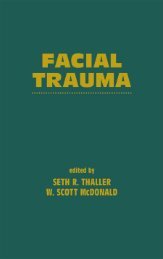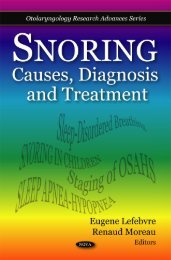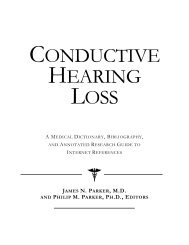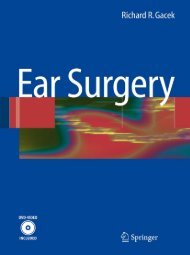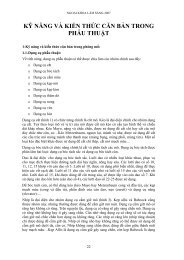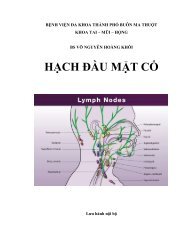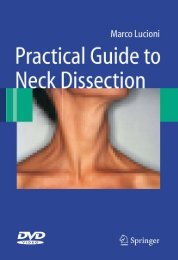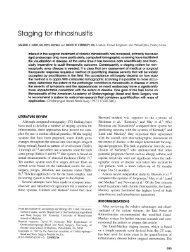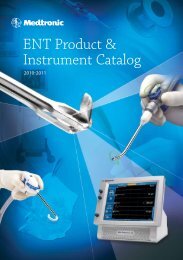Familial Nasopharyngeal Carcinoma 6
Familial Nasopharyngeal Carcinoma 6
Familial Nasopharyngeal Carcinoma 6
- No tags were found...
You also want an ePaper? Increase the reach of your titles
YUMPU automatically turns print PDFs into web optimized ePapers that Google loves.
Adjuvant Chemotherapy for <strong>Nasopharyngeal</strong> <strong>Carcinoma</strong> 195improve ment of overall survival and event-free survival,but this benefit was contributed mainly by thetiming of chemotherapy with concomitant chemotherapybeing most contributory (Baujat et al. 2006).This further questions the value of adjuvant chemotherapyfor managing locally advanced NPC afterconcurrent use of chemotherapy and radiotherapy.To address this, currently a study of concurrentchemo radiotherapy alone with or without threecycles of adjuvant chemotherapy with cisplatin at80 mg/m 2 day 1 with infusional 5-FU at 800 mg/m 2 /day for 5 days every 4 weeks is in progress at the SunYat-sen University in Mainland China.15.4Difficulty in Applying AdjuvantChemotherapy After ConcurrentChemotherapy and RadiotherapyThe application of chemotherapy post chemoradiotherapyis difficult, and this is highlighted by the poorcompliance to planned adjuvant chemotherapy inthe various studies, and has been the experience ofmany groups in managing locally advanced NPC. Inthe Italian and TCOG studies, similar difficultieswere encountered. This reflects the substantial andprolonged toxicities of concurrent chemoradiotherapyfor NPC and is perhaps the greatest drawback ofthis strategy. Concurrent chemoradiotherapy, whichcarried a higher rate of toxicities than radiotherapy,often leaves significant local mucositis and skin reactionsin the radiotherapy field, as well as nutritionalproblems at the end of the radiotherapy, requiringsignificant delay to the start of any planned adjuvantchemotherapy. In the phase III studies evaluating therole of concurrent chemotherapy followed by adjuvantchemotherapy against radiotherapy alone,a common observation was that a significant proportionof patients in the combined therapy armdid not receive all scheduled adjuvant chemotherapy(Al-Sarraf et al. 1998; Wee et al. 2005).One possible clinical situation that has receivedlittle attention is the role of adjuvant chemotherapyafter nasopharyngectomy or radical neck dissectionfor locoregional relapse of nasopharyngeal cancer.This is relatively uncommon in the era of concomitantchemoradiotherapy, but may be considered inthis situation where further radiotherapy carries ahigh risk of toxicity.15.5SummaryThe available clinical evidence indicated a limited rolefor adjuvant chemotherapy in addition to definitiveradiotherapy or concurrent chemoradiotherapy atthis point. This is partly contributed by the difficultyin applying chemotherapy after intensive radiotherapyto the head and neck region. Additional investigationsusing more tolerable, noncytotoxic agents mayimprove the therapeutic window of such an adjuvantstrategy. Other areas of progress may be identificationof patients at higher risk of relapse based on biomarkers-likeplasma EBV DNA copy number, which wouldhelp one to select patients for further adjuvant therapyto reduce local and distant failure.ReferencesAl-Kourainy K, Crissman J, Ensley J, et al (1988) Excellentresponse to cis-platinum-based chemotherapy in patientswith recurrent or previously untreated advanced nasopharyngealcarcinoma. Am J Clin Oncol 11(4):427–430Al-Sarraf M, LeBlanc M, Giri PG, et al (1998) Chemoradiotherapyversus radiotherapy in patients with advanced nasopharyngealcancer: phase III randomized intergroup study0099. J Clin Oncol 16(4):1310–1317Au E, Ang PT (1994) A phase II trial of 5-fluorouracil and cisplatinumin recurrent or metastatic nasopharyngeal carcinoma.Ann Oncol 5(1):87–89Baujat B, Audry H, Bourhis J, et al (2006) Chemotherapy inlocally advanced nasopharyngeal carcinoma: an individualpatient data meta-analysis of eight randomized trials and1753 patients. Int J Radiat Oncol Biol Phys 64(1):47–56Chan AT, Leung SF, Ngan RK, et al (2005) Overall survival afterconcurrent cisplatin-radiotherapy compared with radiotherapyalone in locoregionally advanced nasopharyngealcarcinoma. J Natl Cancer Inst 97(7):536–539Chi KH, Chang YC, Guo WY, et al (2002) A phase III study ofadjuvant chemotherapy in advanced nasopharyngealcarcinoma patients. Int J Radiat Oncol Biol Phys 52(5):1238–1244Chua DT, Sham JS, Wei WI, et al (2001) The predictive value ofthe 1997 American Joint Committee on Cancer StageClassification in determining failure pattern in nasopharyngealcarcinoma. Cancer 92:2845–2855Kwong DL, Sham JS, Au GK, et al (2004) Concurrent and adjuvantchemotherapy for nasopharyngeal carcinoma: a factorialstudy. J Clin Oncol 22(13):2643–2653Lee AW, Lau WH, Tung SY, et al (2005) Preliminary results of arandomized study on therapeutic gain by concurrent chemotherapyfor regionally-advanced nasopharyngeal carcinoma:NPC-9901 Trial by the Hong Kong <strong>Nasopharyngeal</strong>Cancer Study Group. J Clin Oncol 23:6966–6975



